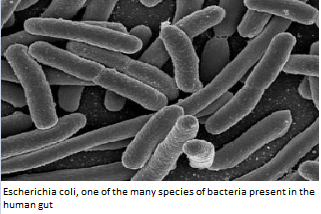
(Photo : en.wikipedia.org)
- Changes in the gut microbiome may signal the onset of rheumatoid arthritis, according to research from the University of Leeds.
- The study followed 124 people at risk of developing rheumatoid arthritis, with 30 progressing to the disease.
- A specific strain of Prevotellaceae sp was found to be abundant in those who developed rheumatoid arthritis.
- These findings highlight the potential of microbiome-based interventions in managing rheumatoid arthritis.
The gut microbiome, a complex ecosystem of microorganisms residing in our intestines, plays a significant role in human health and disease. Recent research has identified changes in the gut microbiome that may signal the onset of rheumatoid arthritis, a chronic inflammatory disorder. Researchers from the University of Leeds and Leeds Teaching Hospitals NHS Trust found that bacteria linked to inflammation in the gut were present in higher amounts about 10 months before patients developed clinical rheumatoid arthritis. This discovery could help identify people at risk and pave the way for preventive and personalized treatment strategies.
The study followed 124 people at risk of developing rheumatoid arthritis for 15 months. The changes in the gut microbiome profiles were assessed using stool and blood samples at five different time points. The presence of precursor anti-cyclic citrullinated protein (anti-CCP) antibodies, which attack healthy cells and are specific for rheumatoid arthritis, and joint pains in the preceding three months were identified as the major risk factors.
Gut Microbiome and Rheumatoid Arthritis Progression
During the study period, 30 of the 124 in the at-risk group progressed to rheumatoid arthritis. Their microbial diversity was also reduced compared to the healthy comparison group. Among people who progressed to rheumatoid arthritis, a specific strain of Prevotellaceae sp was found to be abundant. This strain was also increased at the start of the study, suggesting that the gut bacteria might play a role in rheumatoid arthritis progression. The research was published online in the Annals of the Rheumatic Diseases.
In another study, researchers found that certain changes to the gut microbiome may be linked to the development of rheumatoid arthritis, potentially opening up a new pathway for disease prevention strategies. As of 2020, about 17.6 million people around the world were living with rheumatoid arthritis, an autoimmune disease where the body's immune system mistakenly attacks tissues lining the joints of the hands and feet, causing painful inflammation and swelling.
The Role of Gut Microbiome in Autoimmune Disorders
In a different context, a study found that gut microbiome changes may signal the onset of rheumatoid arthritis. The findings may help identify people at risk and also pave the way for preventive and personalized treatment strategies. Among people who progressed to rheumatoid arthritis, and those who are newly diagnosed a specific strain of Prevotellaceae sp was found to be abundant.
In another study, changes to gut composition were linked with rheumatoid arthritis. An autoimmune disorder is that in which healthy tissues and organs are attacked by the immune system, which normally helps the body fight infection and disease. However, it was not clear if changes, or instabilities, in gut bugs trigger the development of the disease or follow it, the researchers from the University of Leeds, UK, said.
* This is a contributed article and this content does not necessarily represent the views of btin.co.in









